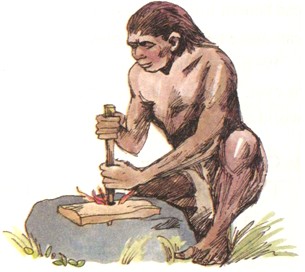-
(单词翻译:双击或拖选)

THE AGES OF MAN
Human achievements come in all shapes and sizes. Knocking two rocks together can be just as important as sending a man to the moon. When ancient humans learnt to use stone tools and make fire, it meant the beginning of modern society. Later discoveries -- bronze1, iron2, steam, electricity, to name a few -- continued the development of society and shaped history. So important were these achievements that we often divide human history into time periods named after the latest technology of the time: the Stone Age, the Bronze Age, the Iron Age and so on.
In modem3 times, scientific achievements have continued to drive the development of society. The eighteenth and nineteenth centuries saw the widespread4 use of electricity and the birth of the steam engine, leading to factories andcities as we know them today. It was also the beginning of public education and the modern branches of science. The twentieth century brought us cars, nuclear power and space exploration5, and is sometimes called the "Atomic6 Age" or the "Space Age". Recently, the effect of computers and the Internet has given rise to the idea that we are living in the "Information Age".
The connection between science and society is easy to see. Whatever the "age", each time period is shaped by the latest and most advanced technology. Scientific achievements also lead to new discoveries and inventions. In some cases, new technology makes it possible for scientists to answer questions and solve problems that once were too difficult. With more and better information, scientists can develop new theories, which in turn lead to future scientific achievements. The wheel of scientific development keeps on turning.
It takes time for a new technology to enter everyday life. In most cases, the first to use it are governments and businesses. For example, electricity was first used in factories and did not become available to homes until several years later. The same was true for computers and cellphones. In the early days, computers were so large, expensive and difficult to use that only government and industry experts could use them. Soon, however, the technology became cheaper and programmes were developed for people who had little or no training.
New technologies also show the role and importance of scientific achievements in society. At first, a new technology is seen as a rare7 and valuable resource8 that can strengthen9 a country and its economy10. Later on, scientists and businessmen develop products that can be bought and used by ordinary consumers11. At the same time, it becomes easier and cheaper to make the products, which means12 that more people can afford to buy products using the new technology. The computer chip is perhaps the best example. When it was first developed, a computer chip was very expensive and could only be made by a small group of experts in developed countries. Today, the technology is well known13 and computer chips are made in factories all over the world.
Our ability to understand and use new technologies has also developed over the years. Science has become perhaps the most important field of study and many governments view science and technology as key to the development of a country. Schools and universities pay special attention to modern technology, both as subjects to study and as tools for teaching14. In China, as in most countries, provinces and cities build "technology parks", such as Zhongguancun, to make sure that companies and customers can benefit15 from the latest advances in science. By supporting research and development, a government can make new technologies and products available to us faster and at lower16 cost.
We have come a long way since the earliest days of humankind, but new discoveries are as important as ever. Whatever the next "age" may be, it is sure to change our life and the way we understand the world and ourselves.

 收听单词发音
收听单词发音
1
bronze

|
|
| n.青铜;青铜艺术品 | |
参考例句: |
|
|
|
2
iron

|
|
| n.铁,熨斗,坚强,烙铁,镣铐;vt.烫平,熨,用铁包;vi. 烫衣服 | |
参考例句: |
|
|
|
3
modem

|
|
| n.调制解调器 | |
参考例句: |
|
|
|
4
widespread

|
|
| adj.广布的,普及的,流传宽广的 | |
参考例句: |
|
|
|
5
exploration

|
|
| n.探险,踏勘,探测 | |
参考例句: |
|
|
|
6
atomic

|
|
| adj.(关于)原子的;原子能(武器)的 | |
参考例句: |
|
|
|
7
rare

|
|
| adj.稀罕的,罕有的,珍贵的,稀薄的,半熟的,非常的;adv.非常 | |
参考例句: |
|
|
|
8
resource

|
|
| n.资源,财力 | |
参考例句: |
|
|
|
9
strengthen

|
|
| vt.加强,变坚固;vi.变强,股票上涨 | |
参考例句: |
|
|
|
10
economy

|
|
| n.经济;节俭;秩序;机体 | |
参考例句: |
|
|
|
11
consumers

|
|
| 消费者,顾客( consumer的名词复数 ) | |
参考例句: |
|
|
|
12
means

|
|
| n.方法,手段,折中点,物质财富 | |
参考例句: |
|
|
|
13
known

|
|
| adj.大家知道的;知名的,已知的 | |
参考例句: |
|
|
|
14
teaching

|
|
| n.教学,执教,任教,讲授;(复数)教诲 | |
参考例句: |
|
|
|
15
benefit

|
|
| n.好处,益处,福利;vt.有益于,对…有益;vi.受益于 | |
参考例句: |
|
|
|
16
lower

|
|
| adj.较低的;地位较低的,低等的;低年级的;下游的;vt.放下,降下,放低;减低 | |
参考例句: |
|
|
|

















